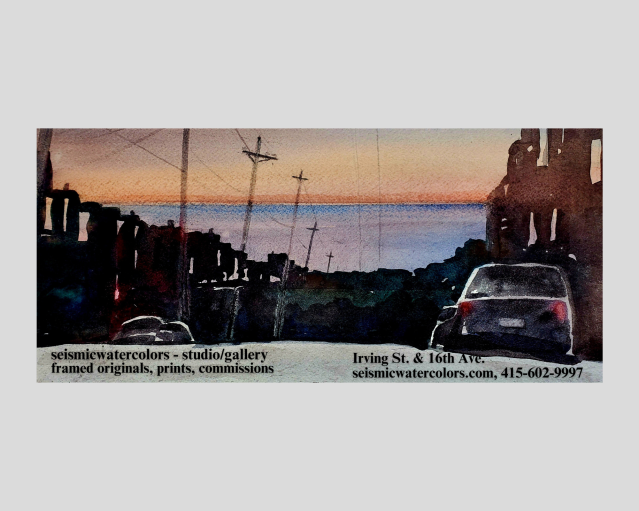By Jack Quach
With his cat, Emilio, resting at his feet in his office, Robert M. Smith sits and reflects on his long career as a journalist. He faces his backyard garden, sunlight streaming in through the window. He is surrounded by framed certificates, photographs and articles hanging on the walls.
“New York Times,” “Yale Law,” “Columbia Journalism,” the papers read. The documents, collected from his decades-long career, chart Smith’s journey through journalism and law.

Smith reveals this path in his recently published book, “Suppressed: Confessions of a Former New York Times Washington Correspondent.” The Sunset District resident, who currently works as an international mediator, largely gained his foothold in the sphere of professional writing as a journalist for the New York Times.
The job “teaches you to look below the surface,” Smith said.
A correspondent for the national publication, he often scrambled to scrawl as many notes as he could in conversations with government officials and directors. His experiences range from gathering information on Watergate to later serving in President Jimmy Carter’s administration.
In his book, Smith lays out the stories he encountered during his multifaceted career, as well as some that were suppressed for various reasons, and addresses what he sees as the problem of bias in the media. He recognizes the growing distrust in American media and now hopes that sharing his experiences working as a journalist will help people have an inside look at how the process operates.
“The aim of the book is to show (readers what the media are really like, and let them get more from this daily activity of consuming media,” he said.

The former New York Times journalist said that his time in law gave more clarity to his earlier journalism career. As a mediator who has worked in various countries around the world, he carries the lessons learned from conducting interviews, investigating the facts and earning trust.
Before his worldwide assignments, Smith’s childhood began in Boston, living in a poor section of the city and writing stories for the local newspaper. For his first assignment, he was sent to cover a family that was about to be evicted from the land on which they lived. After finally convincing the family to be let into the house and clarifying that he was a member of the press, Smith engaged in a conversation with the family.
Upon returning to the Boston publication, he entered a press room filled with clacking typewriters and shouting writers. To escape the noise, Smith went on his own to write his article with pen and paper.
An hour after he submitted his finished story, a newspaper, wet with fresh ink, was dropped on the desk in front of him. He saw his writing on the front page.
“What a craft, what a business, what a profession this is,” Smith said to himself. The feeling of excitement of reading his published story is still with him today.
Smith spent much of his childhood, college years and early professional life on the East Coast. He attended Harvard University as an undergraduate and received degrees from the Columbia Graduate School of Journalism and Yale Law School. However, one mantra guided his move and settlement in San Francisco’s Sunset District: “Follow your heart.”

After graduating from Yale, he began contemplating where he would take the bar examination to start his practice. On a sunny day in the Georgetown area of Washington, D.C., he and his wife tasted sweet, melting ice cream outside a parlor. He posed his wife the question of where they should go next, now that he had begun the transition to law.
“Quite serendipitously,” they moved for a summer to San Francisco, where he decided to work as a law clerk.
Smith spent the next 45 years living in the City, where he continues to live and practice.
In his home office in the Inner Sunset, Smith writes with his cat at the foot of his desk and a “wonderful” garden outside his window. He also spent much of his writing process between the shelves of the nearby UCSF Medical Library, a haven for which Smith has been grateful.
“The Sunset is a very nice place to live,” the author said. “It’s been my home for so long that I’m afraid to take it for granted.”
Smith said that his message both in his book and his work is one of trust.
“Journalism has a lot in common with law and mediation,” he said. “People have to trust you” in order to be candid and genuine.
“The more people come to understand the media and what they’re reading, listening to and watching, the better off things will be,” Smith said about how to approach ongoing national divisions. “They’ll have a chance to understand what’s really happening.”
Despite the news stories he has written for the New York Times that gained national attention, Smith values a different form of his writing the most — one that best reflects human resilience and creativity.
He once traveled to Harlem and interviewed a man who captured his neighborhood through photographs across a span of 50 years. These pieces of work were scheduled to be taken to an undisclosed warehouse because the artist had gotten behind on his rent. When the story revealing the situation was published, “museums came to help and people offered him lodging,” Smith said.
“It’s that sort of story that I’m proudest of.”
“Suppressed: Confessions of a Former New York Times Washington Correspondent,” can be ordered online at Amazon or Barnes & Noble.
Categories: author











